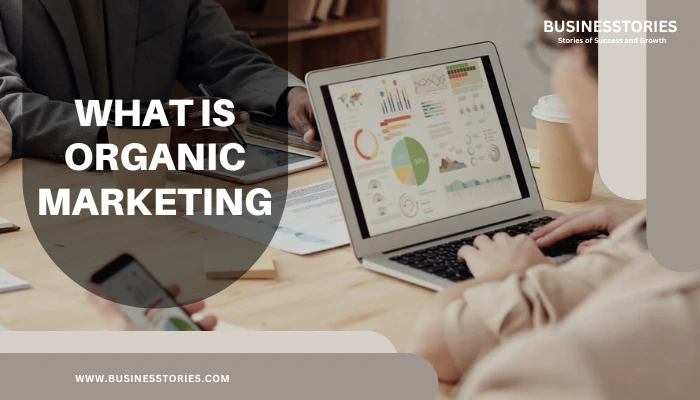Let’s be honest—marketing isn’t what it used to be. Remember when ads actually worked? Now people scroll right past them. They’ve installed ad blockers. They can spot a sales pitch from a mile away. And honestly? They’re tired of being sold to. That’s exactly why smart brands are shifting to organic marketing.
It’s not about shouting louder—it’s about showing up genuinely. No paid ads, no pushy tactics. Just real, helpful content that people actually want to see. It helps you reach people without paying for advertisements.
Organic marketing builds your brand naturally. You’re not buying attention—you’re earning it. And here’s the beautiful part: once you’ve built that foundation, it keeps working for you. That blog post you wrote six months ago? Still bringing in visitors. That helpful video you made? Still getting views.
For anyone just starting out—whether you’re running a small business from your garage or launching your first startup—this approach is gold. You don’t need a massive budget. You need consistency, authenticity, and a genuine desire to help your audience.
In this article, we will understand what organic marketing means, how it works, why it matters, best strategies, benefits, and real examples. This guide will help beginners, whether you’re running a small business from your garage or launching your first startup—this approach is gold. You don’t need a massive budget. You need consistency, authenticity, and a genuine desire to help your audience.
Also Read: Zero-Budget Marketing Hacks for Local Businesses
What Is Organic Marketing?
Organic marketing means promoting your business through free and natural methods instead of paid advertising.
It includes blogs, SEO, social media content, videos, emails, and reviews. The goal is to attract people with valuable content rather than paid promotions.
Organic marketing is also called:
- Non-paid marketing
- Content-driven marketing
- Natural marketing
- Inbound marketing
It is a long-term approach. You build trust step by step. When people like your content, they visit again, buy your products, and even recommend you to others.
What Organic Marketing Is NOT?
Sometimes people get confused. So let’s clear it.
Organic marketing does NOT include:
- Paid ads
- Sponsored posts
- Boosted content
- Display ads
- PPC campaigns
In simple words:
If you pay to show your content, it is not organic. If people discover you naturally, it is organic.
Why Is Organic Marketing Important?
Organic marketing works because it’s natural, trustworthy, and budget-friendly. You’re not forcing yourself into people’s feeds—you’re showing up when they need you. Here’s why that matters:
1. It Builds Long-Lasting Trust
Trust is the most valuable thing in today’s digital world. People trust brands that share useful and honest content. When you share something genuinely helpful, a quick tip, a tutorial, an honest answer—people notice. They remember. Do this enough times, and something shifts. They start coming to you first. That’s trust, and you can’t buy it with ads.
2. It Reduces Marketing Costs
Paid ads work fast and bring instant traffic. But turn them off, and everything stops. Organic content stays online for months or even years and keeps bringing visitors naturally. A blog post you wrote last year? Still working. A helpful video from six months ago? Still bringing people in. That’s the difference
3. It Helps You Rank on Google
Search engines prefers relevant, consistent, and helpful content. When you follow these basics, your website appears higher on search results. Higher ranking means more visibility, more visitors, and zero ad spend.
4. It Attracts Quality Leads
Someone searching for exactly what you offer is already halfway there. They want an answer. They have clear intent and are more interested in your solution. These aren’t random clicks—they’re real opportunities. That is why organic marketing brings high-quality leads.
5. It Strengthens Your Brand Image
Every post, every share, every helpful comment adds up. People start recognizing you. “Oh yeah, I’ve seen them before.” That recognition becomes familiarity. Familiarity becomes trust and, users start trusting your brand more.
6. It Helps You Compete with Big Brands
Even small businesses can compete with large companies through organic marketing. Big budget? Small budget? Doesn’t matter as much as you’d think. What matters is showing up consistently with something valuable. That levels the playing field fast. You just need smart, consistent, and valuable content.
7. It Brings Sustainable Growth
Quick wins feel good. But slow, steady growth? That’s what builds something real. Paid ads give quick results, but the impact ends fast. Organic marketing takes time but grows steadily. Once it picks up, it creates strong and long-term growth for your brand.
Benefits of Organic Marketing
Organic marketing offers many strong advantages. It’s genuinely one of the smartest ways to grow your business. Here are the major benefits that make it powerful:
1. Zero Advertising Cost
Most organic methods are completely free and cost-effective. You can use all these methods including SEO, social media content, email newsletters, and YouTube videos to reach more people. You need to invest your time and creativity, not money.
2. Builds Strong Relationships
Organic content is the same as natural human writing that feels authentic. People connect with it more than traditional ads. This connection helps you build deeper and more meaningful relationships with your audience and people start trusting you.
3. Higher Engagement
When you share something helpful content, people don’t just scroll past it. They like it, share it, comment on it. This boosts your visibility without any paid promotion.
4. Improves Brand Loyalty
When your audience learns from your content and trust what you share, they remain loyal to your brand. Once your audience realizes you’re consistently giving them value; they don’t just disappear. They become loyal fans who keep coming back—and that kind of loyalty is priceless.
5. Better Conversion Rate
People who find you organically are already looking for what you offer. Organic users actually show strong intent when they search. They are already looking for solutions, so they convert faster and more easily.
6. Long-Term Visibility
Your content works while you sleep. That blog post you wrote six months ago? This post remains accessible to users for many years without disappearing. Videos, guides, articles—they continue to bring traffic and leads even months after publishing.
How Organic Marketing Works
Organic marketing follows a simple and natural process, you create something useful, people find it, they start trusting you, and eventually, they become customers. By creating helpful content that answers real questions. People discover this content, begin to trust your brand, and over time, many of them turn into loyal customers.
Let’s break it down:
1. Understand Your Audience
Get inside your audience’s head. What keeps them up at night? What questions are they Googling at 2 AM? Start by understanding what your audience is searching for, which is the same as knowing their exact needs. Look closely at their questions, problems, goals, and pain points. When you understand their struggles and needs, you can create content that genuinely helps them.
2. Create Helpful Content
Make stuff people actually want to read. Organic marketing grows when you create content that provides real value to people. Nobody wants another boring sales pitch. This can be simple tips, step-by-step guides, tutorials, real stories, or industry insights. Share practical knowledge that helps people solve their problems. When your content is genuinely helpful, people keep coming back.
3. Use SEO to Improve Visibility
SEO helps Google understand your website and show it to the right audience. Use simple keywords like “Organic Marketing,” “What Is Organic Marketing,” “Benefits of Organic Marketing,” “Organic vs Paid,” and “Organic Marketing Strategies.” Sprinkle in keywords naturally—things people are actually searching for. This gets your content in front of the right eyeballs at the right time.
4. Stay Consistent
You don’t need to post every day that’s exhausting, but being consistent matters. Consistency builds trust, keeps your audience engaged, and helps your content perform better over time.
5. Engage with Your Users
Talk to people, don’t just broadcast—have conversations. Reply to comments, answer messages, send helpful emails, and join discussions. When you interact with your audience, they feel heard and connected to your brand, which builds long-lasting trust.
Also Read: A Quick Guide To Effective WhatsApp Marketing Strategies For Businesses
Organic Marketing Vs Paid Marketing
Organic marketing builds an audience naturally over time, while paid marketing uses money to reach people quickly.
Organic marketing focuses on building long-term trust and visibility through content, SEO, and consistent engagement, while paid marketing is the sprint—you get quick results by putting your message directly in front of people through ads.
Both approaches are powerful, but they work differently. Organic marketing strengthens your brand naturally over time, whereas paid marketing accelerates reach when you need fast traffic, leads, or conversions. Organic marketing channels are the only way where companies to reach customers without paying for ads
| Feature | Organic Marketing | Paid Marketing |
| Cost | Free or low cost | Requires budget |
| Speed of Results | Slow but steady | Fast and immediate |
| Longevity | Long-term results | Short-term unless ads continue |
| Trust Building | High (authentic) | Moderate |
| Ideal For | Brand building, SEO, community | Quick leads, promotions, launches |
| Examples | Blogging, SEO, social posts | Google Ads, Facebook Ads, YouTube Ads |
Both play an important role in growing a business, but organic marketing builds steady, long-term growth that keeps working even when you stop spending on ads.
Organic Marketing Channels
Organic marketing becomes powerful when you use the right channels. Selecting appropriate platforms is essential for achieving better results. Here are the most effective ones you can rely on today:
1. Search Engine Optimization (SEO)
Search Engine Optimization surely helps websites rank better on Google and other search platforms. SEO helps your website appear on Google when people search for related topics. It is one of the strongest and most reliable organic marketing methods because it brings long-term traffic without paid ads.
2. Blogging
One solid article can bring visitors to your site for years. Blog posts educate your audience and drive consistent website traffic. That’s some serious ROI for a few hours of writing article can rank for months or even years, bringing continuous visitors to your site.
3. Social Media
Platforms like Instagram, Facebook, LinkedIn, YouTube, and Pinterest, pick where people hang out and show up there regularly. Regular posts, reels, stories, and updates allow your audience to interact with your brand without any advertising costs.
4. Email Marketing
Email newsletters help you stay in touch with your audience. They are great for sharing updates, tips, offers, and helpful insights. Emails also build trust because they create direct communication with your readers.
Also Read: 9 Reasons Why Email Marketing Is So Important in Business
5. YouTube Videos
Video content builds trust faster than almost anything else. People love tutorials, behind-the-scenes content, honest reviews—anything that feels real. With the right videos, you can attract new users and keep them engaged for a long time.
6. Customer Reviews and Testimonials
Nothing beats word-of-mouth. When potential customers see others raving about you, that social proof does half the selling for you. When people see positive experiences from other customers, they trust your brand more. Higher trust often leads to more conversions and loyal customers.
Best Organic Marketing Strategies

These organic marketing strategies can help you get strong and consistent results:
1. Create High-Value Content
Make content that solves real problems. Don’t just create content for content’s sake. Answer real questions. Fix real issues. When you’re genuinely helpful, people remember you and come back for more.
High-value content also positions your brand as an industry expert. When users consistently find answers through your content, they begin to rely on your brand for guidance, which naturally increases credibility and long-term loyalty.
2. Use Keyword Research
Do your keyword homework. Figure out what people in your niche are searching for, then naturally weave those terms into your blogs, videos, and social posts. This helps your content rank better on search engines.
Strong keyword research also helps you discover hidden content opportunities. By targeting low-competition keywords, you can attract consistent, high-quality traffic to your website without competing with big brands.
3. Optimize Your Website
Speed up your website. If your website takes forever to load or looks terrible on mobile, you’re losing people. A fast, clean website keeps visitors around longer and makes Google happier.
A well-optimized website helps reducing bounce rates, better user engagement and improved site performance. When visitors enjoy browsing your website, they explore more pages, which sends positive signals to Google and boosts your overall search rankings.
4. Build a Content Calendar
Plan your content weekly or monthly. A content calendar helps you stay consistent and ensures you always have fresh, useful content ready for your audience. And ensures you’re not scrambling for ideas at the last minute.
A good content calendar helps balance different content types like blogs, videos, social posts, and emails, so the audience itself gets mixed valuable information across channels. This ensures consistent engagement through various formats.
5. Use Internal Linking
Link your content together, add links from one blog post to another. It helps Google understand your website structure and keeps readers clicking through more of your content. It improves your chances of website ranking higher.
Internal linking makes visitors stay longer on your website. When readers click through multiple pages, they consume more of your content, which boosts engagement and builds stronger trust.
6. Post Short Videos
Jump on short-form video get higher reach and better engagement. Quick tips, short tutorials, and simple explanations work very well on platforms like Instagram, YouTube Shorts, and Facebook.
Short videos also make your brand more relatable. It makes the brand appearance more approachable and relatable to common people. Seeing a face or voice behind the brand creates emotional connection, which leads to more shares, more followers, and stronger brand recall.
7. Encourage Customer Reviews
Ask your customers to share their reviews. Happy customers will usually share their experience if you just ask. Positive reviews build trust and increase conversions because people believe real experiences more than ads.
Reviews also help you understand what customers love and where you can improve. This feedback process lets you improve your products or services, making your brand stronger and more user-focused.
Real Examples of Organic Marketing
Organic marketing surrounds us in daily life, and this marketing approach itself becomes visible through further observation of our routine activities. Basically, here are simple examples showing how businesses use the same thing effectively:
A Fitness Coach
A fitness coach posts daily workout tips, and healthy lifestyle advice on Instagram. They share short exercise routines for people. People discover these helpful posts, follow the page, which leads them to join paid training programs. The growth happens naturally without ads, which is the same as organic expansion.
A Café
A small café uploads behind-the-scenes videos, latte art video clips, and staff moments to showcase its daily operations. These simple posts help the café build strong local trust. Customers feel more connected and visit more often because they enjoy the brand’s personality.
A Salon
A beauty salon shares skincare tips, hair tutorials, and product advice on YouTube. Viewers learn from the videos and prefer booking appointments online with salons they already trust.
A Clothing Brand
A clothing brand posts styling videos, outfit ideas, and customer look books. People get inspired, see themselves in the clothes, and buy. These posts attract consistent organic reach, and many viewers end up purchasing because they get real inspiration from the content.
Organic marketing works for every type of business—big or small—because people always connect naturally with helpful and relatable content.
Conclusion
Organic marketing takes patience, but it’s worth it. You’re not just chasing quick wins—you’re building something sustainable. You earn trust, increase your visibility, and attract people who are genuinely interested in what you offer.
Organic marketing is one of the strongest ways to grow a business today. Is it slower than running ads? Yeah. But the relationships you build and the credibility you earn? Those last ways longer than any ad campaign ever could. It is free, sustainable, and highly effective for building long-term success.
It helps you earn trust, increase visibility, and attract high-quality leads without spending money on paid ads. This makes organic marketing perfect for small businesses and new brands.
When you stay consistent, share valuable content, and focus on what your audience needs, you create a natural connection with your customers. Over time, this connection turns into loyalty and the business itself experiences steady growth.
Basically, organic marketing is the same as slow cooking. Stay consistent, focus on being genuinely helpful, and watch what happens. The results might take time, but when they come, they stick around.
FAQs on Organic Marketing
Q1. What is organic marketing in simple words?
A: Promoting your business naturally without paid ads.
2. How long does organic marketing take?
A: Usually 2–6 months to show strong results.
3. Is organic marketing better than paid marketing?
A: Yes, for long-term growth.
4. What are the best organic marketing strategies?
A: SEO, blogging, email marketing, and social media content.
5. Is organic marketing free?
A: Mostly free. You invest time, not money.




